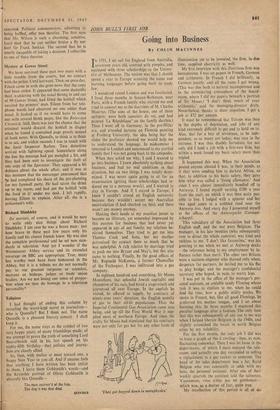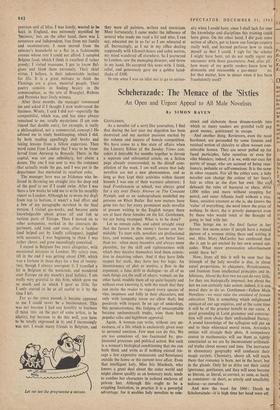JOHN BULL'S FIRST JOB
Going into Business
By COLIN MACINNES
TN 1931, I set sail for England from Australia, Iseventeen years old, covered with pimples, and equipped with three scholarships to the Univer sity of Melbourne. The notion was that I should spend a year in Europe scanning the scene and learning languages before going back to study law.
I wandered round London and was fascinated. I lived three months in Sceaux-Robinson, near Paris, with a French family who starved me and tried to convert me to the doctrines of M. Charles Maurras. (The sons of the house, one of them epileptic, were both camelots du roi, and had painted `La Republique' on the family dustbin.) Then I went off to Germany, in the pre-Hiller era, and attended lectures on Flemish painting at Freiberg University, the idea being that the slides the professor showed me would help me to understand the language. In midsummer I returned to London and announced to my startled family that I was not going back to the antipodes.
When they asked me why, I said I wanted to go into business. I knew absolutely nothing about business, and had no real ambitions in that direction, but on two things I was totally deter- mined. I was never again going to sit for an examination (getting those scholarships had re- duced me to a nervous wreck), and I wanted to stay in Europe. And if I stayed in Europe, I knew I couldn't attend an English university because they wouldn't accept my Australian matriculation (I had checked on this), and there wasn't any money anyway.
Shaking their heads at my manifest intent to become an illiterate, yet somewhat impressed by this passion for business that had never yet appeared in any of our family, my relatives be- stirred themselves. They tried to get me into Thomas Cook and Sons, but my mother patronised the contact there so much that he was unhelpful. A rich relative by marriage tried to push me into Bryant and May's, but this also came to nothing. Finally, by the good offices of Mr. Reginald McKenna, a former Chancellor of the Exchequer, I was infiltrated into a gas company.
In eighteen hundred and something, Sir Moses Montefiore, that splendid Jewish capitalist and champion of his race, had hired a stage-coach and journeyed all over Europe. In the capitals he visited, he offered to supply, by contracts of ninety-nine years' duration, the English novelty of gas to their oil-lit populations. Thus the Imperial Continental Gas Association came into being, and up till the First World War it sup- plied most of northern Europe. And since the crafty Sir Moses had stipulated that his contracts were not only for gas but for any other form of `They got bogged down in metaphysics.'
illumination yet to be invented, the firm, in due time, supplied electricity as well.
My first interview with this illustrious firm was inauspicious. I was set papers in French, German and arithmetic. In French 1 did brilliantly, in German poorly, and all the sums I got wrong. (This was due both to natural incompetence and to the intimidating atmosphere of the board- room, where I did my papers beneath a portrait of Sir Moses.) 'I don't think much of your arithmetic,' said the managing-director dryly. Nevertheless, thanks to sheer nepotism, I got a job at £52 per annum.
It must be remembered that Europe was then in the depths of depression, and jobs of any kind extremely difficult to get and to hold on to.
Also, that for a boy of seventeen, to be inde- pendent, as so many are today, was rare in the extreme. I was thus doubly fortunate, for not only did I land a job with a first-rate firm, but within a week found my basic salary more than tripled.
It happened this way. When the Association posted anyone abroad it was, in their minds, as if they were sending him to darkest Africa, so that, in addition to his basic salary, they gave him what was called a 'living allowance.' And since I was almost immediately bundled off to Antwerp, I found myself earning £180 a year from the start, on which it was then quite pos- sible to live. I lodged with a spinster and her two aged aunts in a cobbled road near the Antwerp zoo. And every day I presented myself at the offices of the Antu'erpsche Gasmaat- schappij.
This subsidiary of the Association had three English staff, and the rest were Belgians. The manager, in his late twenties (who subsequently rose to direct the whole concern), was kind and ruthless to me. 'I don't like favourites,' was his greeting 'to me when we met at Antwerp docks —the reference being to my employment by in- fluence rather than merit. The other two Britons were a taciturn engineer who thawed only when, desperate for partners, he invited me to his flat to play bridge; and the manager's confidential secretary who hoped, in vain, to marry him.
I was put in the office of the manager's per- sonal assistant, an amiable sandy Fleming whose task it was to explain to me, when he could find the time, how a public utility works. We spoke in French, but, like all good Flemings, he preferred his mother tongue, and I set about learning this. In three months I mastered this peculiar language after a fashion. The only time that this was subsequently of any use to me was when I helped liberate Belgium in the 1940s, and slightly astonished the locals in north Belgian cities by my volubility.
For the first month, the only job I did was to keep a graph of the £ sterling—then, as now, fluctuating somewhat. Then I was let loose in the departments, of which I most enjoyed the sEtle- room, and actually one day succeeded in selling a replacement to a gas cooker to someone. The
head of the sales department was a fat, florid Belgian who was constantly at odds with my boss, the personal assistant. After one of their weekly quarrels the assistant told the salesman, 'Coosemans, vows n'etes pas un gentleman'— which was, as a matter of fact, quite true. My recollection of this period is all of de- pression and of bliss. I was lonely, wanted to be back in England, was extremely mystified by `business,' but, on the other hand, there was I, seventeen and independent, free from my family and examinations. I soon moved from the spinster's household to a flat in a fashionable avenue whose rent I could not afford. I sampled Belgian food, which I think is excellent if rather greedy; I visited museums, I got to know Bel- gians and liked them extremely. Their chief virtue, I believe, is their indomitable instinct for life. It is a great mistake to think the Flemings are a gross, material people. Their poetry consists in finding beauty in the commonplace, as the arts of Brueghel, Rubens and Permeke bear lively witness.
After three months, the manager summoned me and asked if I thought 1 now understood the business. Wisely, I said I did not—especially the cqmptabilite, which was, and has since always remained to me, totally mysterious. (1 am con- vinced that double entry, for example, is really a philosophical, not a commercial, concept.) He advised me to study bookkeeping, which I did, by both reading appallingly dull books and taking lessons from a fellow expatriate. Then word came from London that I was to be trans- ferred from Antwerp to Brussels. There, in the capital, was not one subsidiary, but about a dozen. The one I was sent to was the company that actually made the gas, and I was put in the department that marketed its resultant coke.
The manager here was an Irishman who be- lieved in throwing me straight into the deep end of the pool to see if I could swim. After I was there a few weeks he told me to write his monthly report to London. Although he re-wrote my draft from top to bottom, it wasn't a bad effort and a few of my paragraphs survived in the final version. I visited gas-works, and became quite knowledgeable about prices cif and fob to various parts of Europe. Then I &loved 'On to other companies, worked in the contracts de- partment, sold land, and even, after a fashion (and helped out by kindly colleagues), juggled with accounts. I was beginning to think I was rather clever, and grew exceedingly conceited.
I stayed in Belgium five years altogether, with occasional missions to London. My salary rose, till in the end I was getting about £300, which was a fortune in those days for a boy of twenty- two, though I always overspent it. I travelled a lot in Belgium at the weekends, and wandered over Europe on my month's paid holiday. I am really -very grateful to this firm, which gave me so much and to which I gave so little, for I only started to be at all useful to it by the time I left.
For as the years passed, it became apparent to me I could never be a businessman. This was not because I had any hostility to business (I think this, on the part of some artists, to be idiotic), but because to do this well, you have to be totally engrossed in it; and I increasingly was not. I made many friends in Belgium, and Let me see the programme a minute. they were all painters, writers and musicians. Most fortunately, I came under the influence of several who made me read a lot and who, I can say, educated me in so far as I am educated at all. Increasingly, as I sat in my office dealing supposedly with kilowatt-hours and cubic metres, my mind wandered off elsewhere. So I journeyed to London, saw the managing director, and threw in my hand. He accepted this news with, I think, relief, and generously gave me a golden hand- s-hake of £100.
In one sense I was an idiot not to go to univer- city when I could have, since I shall lack for ever the knowledge and disciplines this training could have given. On the other hand, I did gain some notion of affairs, got to know one foreign country really well, and learned perforce how to teach myself as best I could. I sigh for the scholar I might have been, yet do not really regret my encounter with those gasometers. And, after all: how many of my gentle readers know how to dismantle and reassemble a gas-meter or, for that matter, how to detect when it has been fraudulently used?

















 Previous page
Previous page